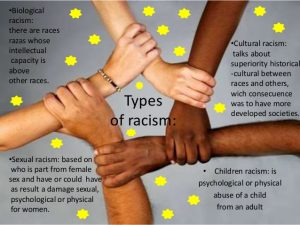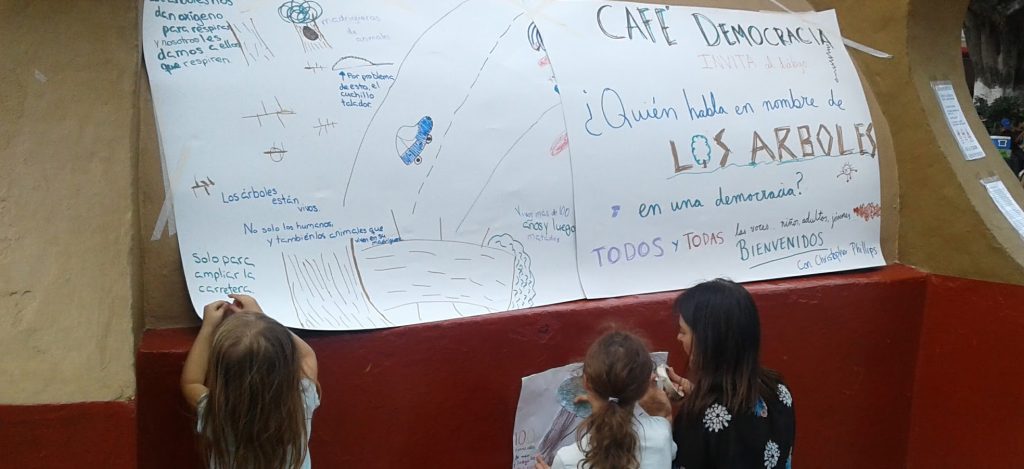
Last Saturday, while in Mexico, I attended a party that was an early celebration of Dia de los Muertos (Day of the Dead — a much more significant and often-noncommercial kindred to our Halloween), which officially launches today?
As marvelous a country as it is in so many ways, Mexico is extremely racist, as most anyone with open eyes who’s lived here for any length of time comes to realize. White skin matters, skin less than white matters less and less, in Mexico, depending on degree. Worse, many ‘progressives’ here refuse even to acknowledge there is a race problem.
At this party that my wife and I attended, many on hand were parents (in some cases, with their children), who attend the same private school. One of the moms from the school came as a ‘Negra’, as she proudly told anyone in earshot. I was aghast. I know for a fact that there are a number of black parents with children at the school. What if one of them had attended (instead of the sea of white and nearly white faces at the party)? (And why didn’t any attend? Were they not invited?) What would they have thought of this person coming not just in ‘black face,’ but in ‘black body, yes, her entire body painted black? (We have a photo of this woman, but do want to ‘shame’ her here.) What would they have thought of all those at the party admiring her ‘costume’? Not a single person there, besides me and my wife, expressed dismay even in the slightest by what Ceci and I considered a virulently racist display; indeed, they thought it was ‘cool.’
How could this woman (much less all the others attending) possibly think this was cool, much less appropriate, I asked myself? I felt like I’d stepped back well over a half century in time, and it was not pleasant; it was horrifying. Ceci and I finally had enough of this depressing sight, and we left the party way early, all the while asking ourselves: is there any way even to gently point out that this was racist to the large group of mostly parents on hand who saw nothing in the slightest wrong with this ‘costume’?
How do you have a conversation on race with people with a pervasive sensibility that something you yourself consider mind- and heart-numblingly racist is not so at all? I have friends on Facebook who attended this party who might read this. Most, I suspect, will take offense at my observation. For them, it’s just a Day of the Dead costume party, no more or less, and it’s perfectly normal for a person dressed as a ‘Negra’ or a ‘Negro’ to attend.It’s funny, even; it’s cool. These are people who claim to be raising their kids responsibly, with open minds and hearts, yet are blind to what I would hope all people in my own orbit of friends would consider overtly racist?
How can we help one another open our eyes to less savory aspects of our dispositions, so that we in turn can open up our society’s eyes? Heaven knows I have my fair share of blind spots. I need others to serve as thoughtful and empathic mirrors into my own sensibilities, so I can transform those aspects of my nature that are less redemptive or less than redemptive.
Is there a way to do so gently yet insistently? How can my own Socrates Cafe initiative play a meaningful part in this? Socrates Cafe, as you know, is all about group inquiries that are the furthest thing from encounter group sessions — potentially transformative inquiries that make us both more connected and more autonomous at the same time. So, part of my own effort in this regard is to pose and delve into questions that deal with race and racism in a timely and timeless way simultaneously, and that inspire participants to serve as mirrors into one another’s blindspots, and further inspire them to confront and
I know one thing, and I’ve expressed this in some of my Childing blogs — this one, for instance — and it is also present in my Childing book: Children do not naturally act in racist ways. It’s not that they are colorblind, but color sensitive, appreciative of the dazzling array of colors of human skin. Kids judge by the color of one’s character rather than the content and makeup and exterior color of one another’ skin. And they would never, ever ever dress in black face, much less in black body — until and unless they learn from adults that this is ok, appropriate, accepted.
We adults are capable of unlearning the most vile and destructive aspects of what we have cultivated and taught and (consciously or otherwise) modeled to our youngest — and we can do so, first and foremost, by letting kids be our consciences, our examples, our guides. If there is hope for us, they can show us the way.

